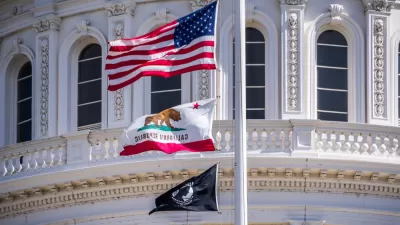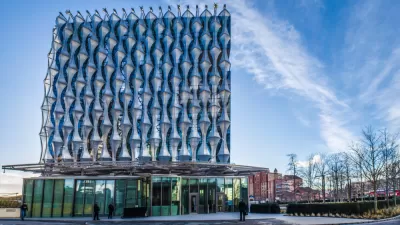The battle over the efficiencies and infrastructure required in building codes continues.

In March 2021, the International Code Council (ICC), a private consortium that controls building code regulations for most of the United States and Latin America, voted to "reduce the power of cities and local jurisdictions over building efficiency requirements," according to March 2021 Planetizen coverage of the news.
The ICC's vote came as a final, sweeping blow in a long battle by industry powers to push back against local control over local building and energy laws. With its March 2021 vote, the ICC decided to remove code making powers from local governments, placing those responsibilities instead in the hands of a "technocratic committee that gives companies equal say to public servants," according to Alexander C. Kaufman, writing for the Huffington Post (Kaufman also provided breaking new coverage of the ICC vote in March 2021).
Kaufman is still tracking the ongoing battle over carbon emissions from the nation's building stock. In March 2022, Kaufman reports that "new drama is afoot" at the ICC, after "a single email secretly sent by a gas utility nearly gutted a proposal widely seen as vital to increasing the adoption of electric vehicles."
Here are the salient details of the drama:
After weeks of discussion over a proposal to require developers to include the circuitry to charge electric vehicles in more new buildings ― which can cost more than six times more to retrofit into a structure after it’s built ― the chairman of the committee, Duane Jonlin, abruptly announced in an email that he had decided to strike the proposal from the code. Instead, he said it belonged in the “appendix” that serves as a bonus menu that some more ambitious cities and towns may choose to adopt, according to copies of the exchange HuffPost obtained from a source who requested anonymity because the internal emails were private.
Kaufman and the HuffPost team dig deeper via public records request, reporting that Spire Energy, the $3.5 billion St. Louis-based gas company, "privately reached out to challenge the electric vehicle provisions."
According to Kaufman, environmentalists and code reform advocates fear the incident reveals broader leverage for polluters in building codes than before last year's vote.
FULL STORY: A Battle Over Building Codes May Be The Most Important Climate Fight You’ve Never Heard Of

Planetizen Federal Action Tracker
A weekly monitor of how Trump’s orders and actions are impacting planners and planning in America.

Congressman Proposes Bill to Rename DC Metro “Trump Train”
The Make Autorail Great Again Act would withhold federal funding to the system until the Washington Metropolitan Area Transit Authority (WMATA), rebrands as the Washington Metropolitan Authority for Greater Access (WMAGA).

The Simple Legislative Tool Transforming Vacant Downtowns
In California, Michigan and Georgia, an easy win is bringing dollars — and delight — back to city centers.

The States Losing Rural Delivery Rooms at an Alarming Pace
In some states, as few as 9% of rural hospitals still deliver babies. As a result, rising pre-term births, no adequate pre-term care and "harrowing" close calls are a growing reality.

The Small South Asian Republic Going all in on EVs
Thanks to one simple policy change less than five years ago, 65% of new cars in this Himalayan country are now electric.

DC Backpedals on Bike Lane Protection, Swaps Barriers for Paint
Citing aesthetic concerns, the city is removing the concrete barriers and flexposts that once separated Arizona Avenue cyclists from motor vehicles.
Urban Design for Planners 1: Software Tools
This six-course series explores essential urban design concepts using open source software and equips planners with the tools they need to participate fully in the urban design process.
Planning for Universal Design
Learn the tools for implementing Universal Design in planning regulations.
Smith Gee Studio
City of Charlotte
City of Camden Redevelopment Agency
City of Astoria
Transportation Research & Education Center (TREC) at Portland State University
US High Speed Rail Association
City of Camden Redevelopment Agency
Municipality of Princeton (NJ)





























